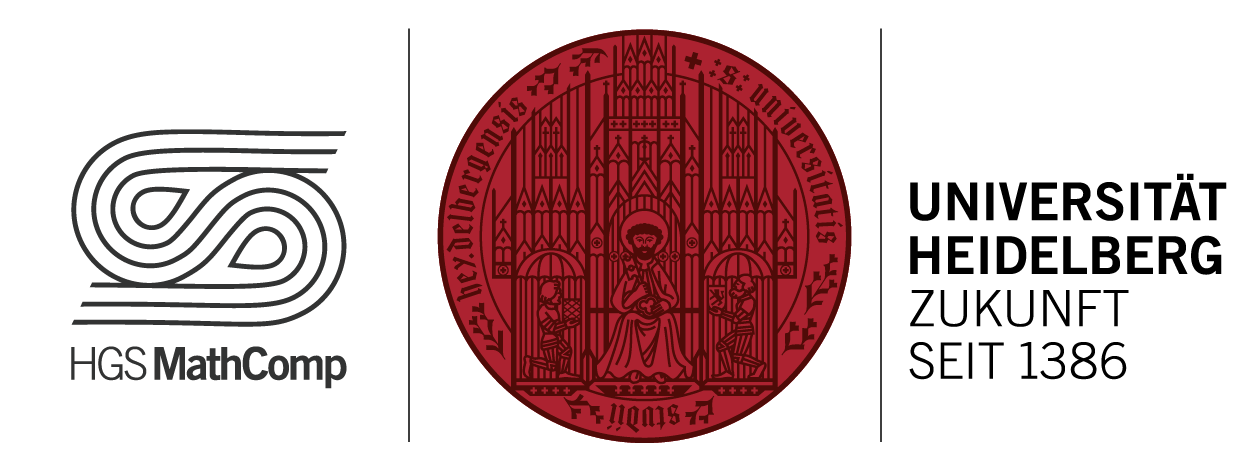
HGS MathComp - Where Methods Meet Applications
The Heidelberg Graduate School of Mathematical and Computational Methods for the Sciences (HGS MathComp) at Heidelberg University is one of the leading graduate schools in Germany focusing on the complex topic of Scientific Computing. Located in a vibrant research environment, the school offers a structured interdisciplinary education for PhD students. The program supports students in pursuing innovative PhD projects with a strong application-oriented focus, ranging from mathematics, computer science, bio/life-sciences, physics, and chemical engineering sciences to cultural heritage. A strong focus is put on the mathematical and computational foundations: the theoretical underpinnings and computational abstraction and conception.
HGS MathComp Principal Investigators are leading experts in their fields, working on projects that combine mathematical and computational methodology with topical research issues. Individual mentoring for PhD candidates and career development programs ensure that graduates are fully equipped to take up top positions in industry and academia.
Current Opportunities
4EU+ Joint DFH/UFA workshop on AI in Medicine: Optimised Trials with Machine Learning (Paris)
Deadline: April 30, 2024
Upcoming Events [see all...]
13:00 - 17:00
[ more ...]
Location: Online
Registration: Please register on the event website
Organizer: Graduate Academy
18.04.2024 • 13:00 - 17:00
25.04.2024 • 13:00 - 17:00
02.05.2024 • 13:00 - 17:00
Requirements:
No previous programming knowledge is required! We will use our own server platform for the course, therefore no additional installation of software is needed.
This course is part of the course program of the Graduate Academy. The latest information and a registration link are available on the course website (log in with Uni-ID).
HGS MathComp fellows can get a reimbursement of the course fees. Please submit your proof of payment and certificate of participation to hgs@iwr.uni-heidelberg.de.
Within the scope of this course, you will master the Python philosophy, syntax, and writing your own scripts and modules. In addition, you will use your newly acquired skills to perform hands-on exercises and learn to conduct reproducible in-silico research. After completing this course, you will be ready to start your own Python journey and delve deeper into the world of Data Science.
09:00 - 12:30
[ more ...]
Location: Mathematikon • Seminar Room 11, 5th floor • Im Neuenheimer Feld 205, 69120 Heidelberg
Registration: Please register here
Organizer: HGS MathComp
This lecture presents some basic topics on probability, Bayesian statistics theory, analytical results on partial differential equations (PDEs) and inverse problems. The combination of these methods led to general approaches that can be used to derive efficient and robust approximations to solve inverse problems with uncertainty quantification. By the end of this course, students will gain insights into how these methods contribute to providing more accurate and reliable schemes to solve inverse problems with uncertainty quantification.
In the practice sessions, we present specific inverse problems, allowing the students to actively engage with the material and develop practical solutions through coding exercises.
- Introduction: mathematical models and inverse problems.
- Basic topics in probability theory and functional analysis.
- Inverse problems, Bayesian inference and uncertainty quantification.
- Existence and consistency (stability) of posterior distributions.
- Exploring the posterior and sampling methods.
- Stability estimates for linear PDEs and physically informed models.
- Day 1: 2 x 90 minutes sessions
- Day 2 to 4: 1 90 minutes session + 1 90 minutes practice session
12:00 - 13:00
[ more ...]
Organizer: Scientific Software Center (SSC)
The RSE coffee hour aims to bring together RSEs at all career stages! Join us for a cup of coffee and chat about challenges and strategies for developing research software.
*Research Software Engineer (RSE) = someone who develops their own software as part of their
research
**https://ssciwr.github.io/lunch-time-python/

